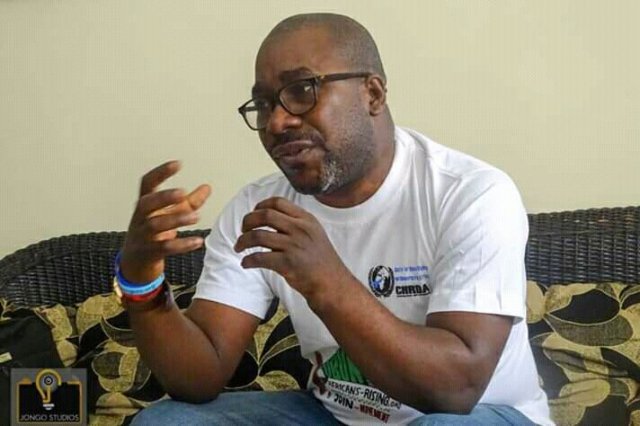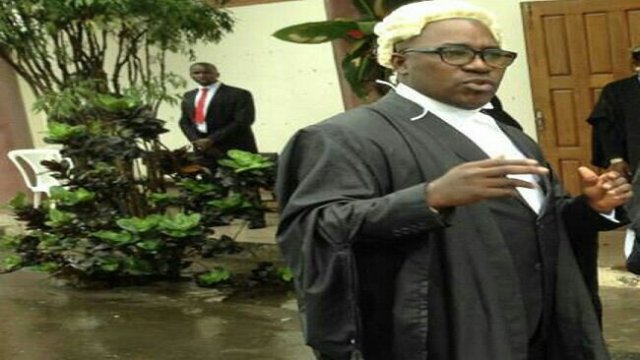Bar. Agbor Nkongho, the lawyers took to the street because we needed to fight against marginalisation and there was an attempt to erode the common law system
4 min readLawyers took to the street because they needed to fight against marginalization and because there was an attempt to erode the common law, trying to Francophonize the Anglophones and to ensure that civil law takes dominant over the common law system

The human rights activist, the founder and CEO of Centre for Human Rights and Democracy in Africa, Barrister Agbor Nkongho in his another international outing to Germany lambasted the waning human rights violations in the Anglophone regions of Cameroon. During an interview in the German television station (DW) on the 28/11/2018, the human rights activist did not hesitate to tell the world the reasons for lawyers protest when the journalist ask him what took the lawyers to the street. He said

“lawyers took to the street because we needed to fight against marginalization, there was an attempt to erode the common law, and Cameroon is a bicultural and bijural law system from our colonial history, French and English are the official languages and the common law and the civil law, but there was an attempt to erode the common law” the above statement from Barrister Nkongho summarizes the real and the actual cause of the Anglophone crisis. Worthy to note is the fact that citizens of the Anglophone regions of Cameroon have witness pain and suffering for more than 56years since the United Nation denied them their right to full independence in 1961. There is marginalization because the Anglophones are always viewed as second class citizens in the Cameroonian jurisdiction by the majority Francophone. Hear the human rights activist speak “the lawyers took to the street because they needed to fight against marginalization”

It is worthy to note that what we are experiencing in the Anglophone regions of Cameroon started as a peaceful protest by the lawyers in October 2016 and followed by the teachers strike In November 2016 and grown into a conflict today because of government negligent in handling lawyers and teacher’s plight. Because of poor administration, the awaited moment for the already frustrated population came when the front lines leaders like Bar. Agbor Nkongho, Dr. Fontem and others were arrested, transferred to Kondengui central prison Yaounde and charged with the crimes like terrorism, incitement of public violence and the rest. Because of this arrest, citizens of the Anglophone regions of Cameroon started agitating for their release but in vain. The failure of the government to release these front leaders steadily and gradually lead to the arrest, torture and killing of protesters which lead to the formation of arm groups to apply the principle of self defense

According to the human rights defender, what lead to the full grown arm conflict in the Anglophone regions of Cameroon is as the result of government act towards the citizens. He did mention of the facts that the government security forces have burn more than 120 villages. Thus, contributing to the refugee crisis and the aggravation of Internally Displaced Persons (IDP) crisis which has led to both physical and psychological suffering in the region. While explaining the mystery behind government act towards the civilians, the barrister told the world that more than 500,000 IDPs are suffering in Cameroon while more than 50,000 refugees have run to Nigeria for their safety. The destruction of property is not left out as both the Separatist fiaghters and security forces have embarked on destruction of property of any suspect who goes against their agenda

The Most torching part is the killings, the arrest and torturing of civilians in this part of the world. Given that civilians are being killed every day in the region, it has open widely the application of self-defense which is gradually changing into something bigger than self-defense.
Berinyuy Cajetan is the founder and publisher of Human Rights and Legal Research Centre (HRLRC) since 2017. He has intensive experience in strategic communications for Civil Society Organizations, campaign and advocacy, and social issues. He has an intensive experiencing in human rights monitoring, documentation and reporting.
Berinyuy Cajetan is the founder and publisher of Human Rights and Legal Research Centre (HRLRC) since 2017. He has intensive experience in strategic communications for Civil Society Organizations, campaign and advocacy, and social issues. He has an intensive experiencing in human rights monitoring, documentation and reporting.



